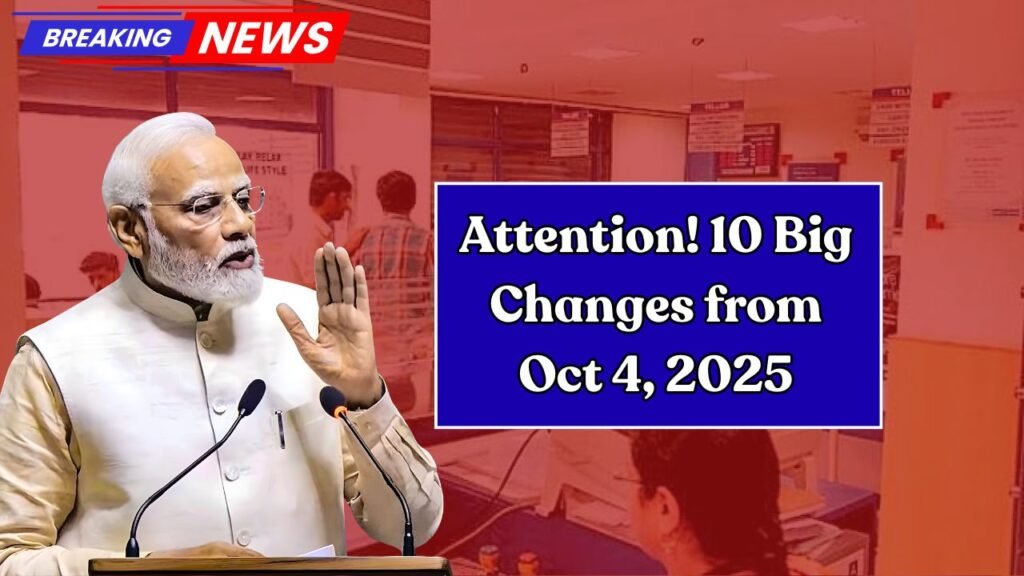On October 4, 2025, the Indian government announced 10 new rules to make services simpler, improve governance, and ensure better law compliance. These updates affect many areas such as taxes, banking, transport, social security, and digital services. While these changes are meant to make life easier, they also bring new responsibilities for citizens. Let’s understand what these new rules mean for you.
1. New Income Tax Filing Deadline
The government has extended the income tax return filing deadline. Earlier, it was October 31, but now it’s December 31, 2025. This change gives individuals and small businesses more time to collect documents, claim deductions, and file returns peacefully. But if you miss this new deadline, you will still have to pay a penalty. So, it’s better to plan early and file your tax returns on time.
2. Mandatory PAN-Aadhaar Linking
From October 4, 2025, linking your PAN with Aadhaar has become compulsory. If you don’t do this, your PAN can become invalid and you might face penalties. The main goal is to stop tax evasion and make financial transactions smoother. You can easily link your PAN and Aadhaar online through the Income Tax portal. If not done yet, it’s best to complete this linking soon to avoid any issues later.
3. Digital Vehicle Registration Process
The transport department has now gone digital. Vehicle registration, renewals, and permits can be done fully online. There’s no need to stand in long queues at RTO offices anymore. This digital system saves time and reduces paperwork. Penalties for delays in renewals are now the same across all states, making the process uniform and simple.
4. Revised Banking Norms for Small Depositors
The Reserve Bank of India has made new rules for small depositors to make banking safer. Banks must now give interest on savings accounts every three months instead of once a year. Also, deposit insurance coverage has been increased. This means your money in the bank is now more protected. These steps will especially help small savers feel more secure about their money.
5. Improved Social Security Benefits
The government has improved benefits for pensioners, retired employees, and low-income workers. Pensions under the Employees’ Pension Scheme (EPS 95) have been raised. Benefits under the National Social Assistance Programme have also been updated. People should update their bank and personal details so they can receive the new payments without any delays. This move is expected to give financial relief to many families.
6. Stricter Rules for Online Content Platforms
Social media and online content sites now have to follow stricter rules. Platforms must improve how they check harmful content, handle user complaints, and protect user data. These changes help make the internet a safer place for everyone. If you use social media or upload content online, make sure you understand these new rules so you don’t accidentally break them.
7. Updates in Health and Safety Regulations
New rules have been introduced for public spaces, workplaces, and hospitals to improve hygiene and safety. These include better cleanliness standards, stronger emergency systems, and regular safety checks. People working in public places or running businesses should know these rules well. Following them is not only good for safety but also helps avoid fines for not following the law.
8. New Education Guidelines
The education system has also been updated. Schools now have new guidelines for teaching, safety, and digital learning. There are changes in curriculum standards, exam methods, and use of technology in classrooms. Parents and students should stay informed about these updates as they might affect admissions, exams, and study patterns. The focus is on making learning safer and more digital-friendly.
9. Tougher Penalties for Environmental Violations
To protect the environment, the government has raised penalties for pollution and illegal activities like waste dumping, tree cutting, and water pollution. These strict rules apply to both individuals and businesses. Everyone must follow them to avoid heavy fines and to help protect nature. This move shows how serious the government is about solving environmental issues.
10.New Rules for Digital Payments and E-Commerce
Digital payments and online shopping platforms now have clearer and safer rules. These aim to make transactions transparent and protect customer rights. Disputes between buyers and sellers can now be resolved faster. For users, this means safer online shopping and better protection from fraud. It’s a good idea to save records of all your online payments and stay aware of these new consumer rules.
How These Changes Affect Citizens
These 10 new rules will impact everyone in different ways. From paying taxes to shopping online, almost every part of daily life will be touched by these changes. The government wants to make things faster, easier, and safer for citizens. But to enjoy these benefits, people must follow the new rules carefully. Staying informed and updated is the best way to make the most of these reforms.
Conclusion
The new government rules from October 4, 2025, aim to make life more efficient and secure. They bring improvements in taxes, banking, transport, health, and digital systems. Citizens who stay aware and follow these new guidelines will enjoy smoother services and more safety in their daily lives. These reforms show a strong move toward a more digital, transparent, and responsible India.
Disclaimer:This article is for general information purposes only. The details shared are based on official government updates available as of October 2025. Citizens should verify the rules from official government portals before taking any financial or legal action. The writer does not take responsibility for any decisions made based on this content.




